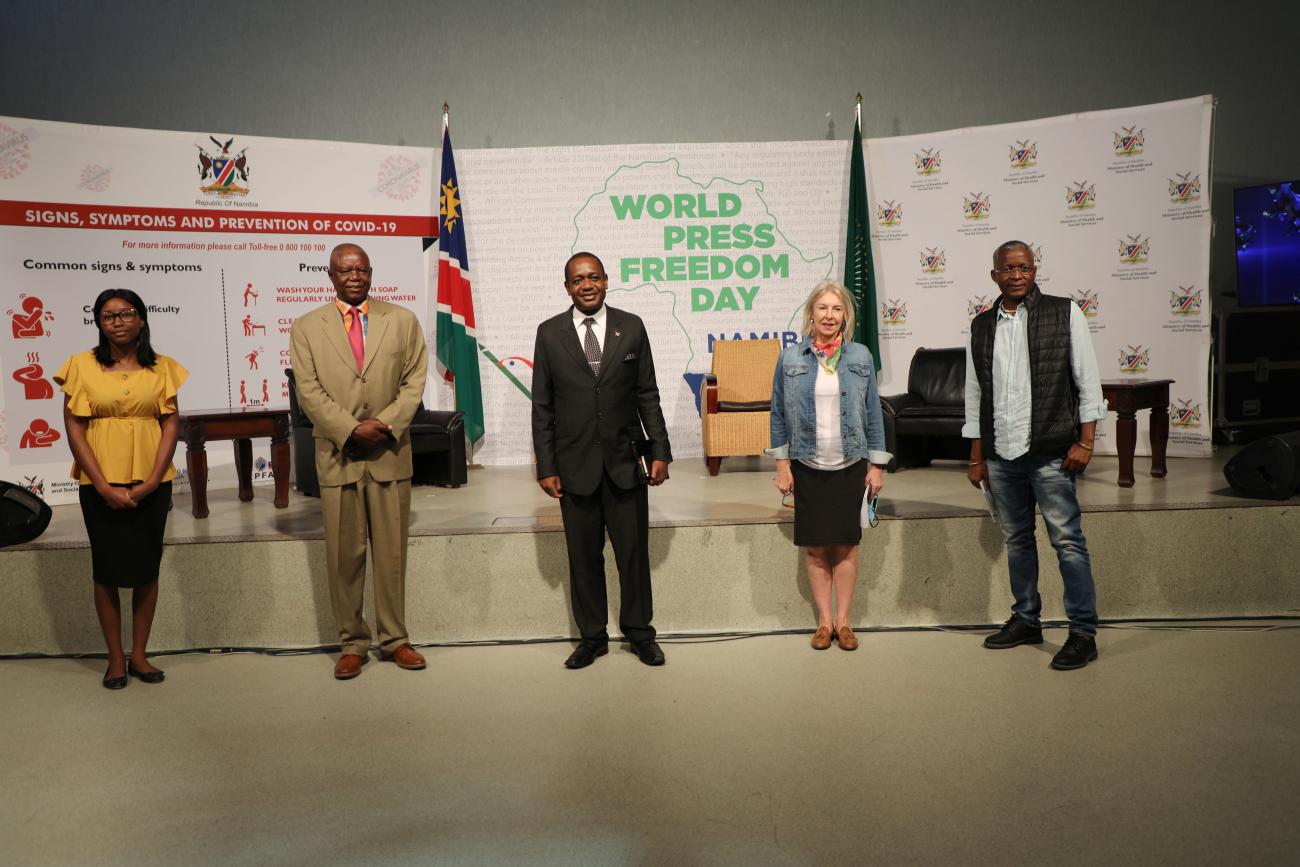World Press Freedom Day was a day of reflection among not only media professionals but the public at large regarding press freedom and professional ethics. In Windhoek, a live panel discussion took place at the COVID-19 Communication Centre on Sunday 3 May. A panel of veteran journalists and media stakeholders sat down to explore the theme “Journalism without fear or favour during COVID-19.”
UNESCO Representative, Guy Berger who joined the discussion via Skype, said that independent media is crucial during this pandemic. “Facts like food are basic needs that people cannot live without. Credible media provides information of where people get help and what to do during a crisis like COVID-19,” he said. Berger expressed anticipation for 2021, as Namibia will be hosting the 30th Anniversary of World Press Freedom Day.
“The 1991 Windhoek Declaration birthed the World Press Freedom Day, that promotes pluralism and independence of the media,” said veteran journalist and editor, Gwen Lister, Executive Chairperson for Namibia Media Trust.
Lister, who was also one of the panellists during the discussion, expressed her disappointment that Namibia has not utilised its number one spot in press freedom in Africa to spread the word around press freedom internationally. “A free and independent media are indispensable pillars of democracy”, Lister said, she however cautioned the public on information they forward on social media, noting that the COVID-19 pandemic is bad, however the infodemic is worse.
Frank Steffen, chairperson of the Editors Forum of Namibia was also part of the panel discussion. He highlighted that pluralism and independence is important. He said that Government should serve all media and not just state-owned media. Steffen said that although Namibia fares well in press freedom continentally, the country lags behind globally and more must be done in order to position the country globally. He noted that the access to information law if promulgated will solve many problems and provide for both media houses and advertisers to be partners serving the public.
Dr. Peya Mushelenga, Minister of Information and Communication Technology (ICT) said that media independence means independence not only from government but pressure groups as well. “Media should be factual, avoid bias and prejudice and be willing to self-correct,” he said. He further noted that good journalism should be commended and upheld. Mushelenga noted that the Access to Information Bill currently lies with legal drafters.
Namibia’s Media Ombudsman, John Nakuta drew focus to the code of ethics that govern all print and electronic media in Namibia. “Ethics are important to serve humanity and people can report any disservice from media to the media ombudsman,” he said.
World Press Freedom Day serves as reminder of the importance of a free and independent press and put media professionals front and centre as they are often targets for the restraint, or abolition, of press freedom. In many countries, publications are censored, fined, suspended and closed down, while journalists, editors and publishers are harassed, attacked, detained and even murdered. Some journalists have even lost their lives in pursuit of a story, and therefore World Press Freedom is not just an ordinary day, it is a tribute to extraordinary media people who risk their safety to report and bring the public the facts. “Let’s appreciate journalists today,” is a call Lister made during the live panel discussion.
The work of journalists is in favour of public interest and preserve accountability – something thriving democracies cannot go without.
During the COVID-19 pandemic, the role of professional journalists who are trained to help sort through the flow and provide necessary guidance is vital. A crisis of this magnitude cannot be resolved without accurate and reliable information and now more than ever there is an urgent call to trust credible journalism, verified evidence based on facts and science.
UNESCO Representative in Namibia, Djaffar, Moussa-Elkadhum expressed his Offices’ support for free and independent journalism. In a separate statement, Djaffar highlighted that media professionals should report without fear. “We need them now more than ever; they are working on the frontline in the current crisis. We must trust in journalism for accurate and reliable information,” he said.






